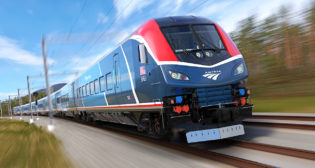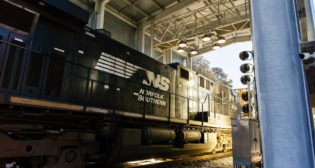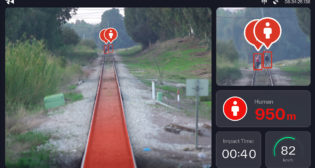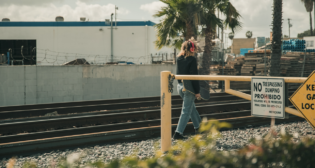
CEO: Amtrak won’t run trains on non-PTC track
Written by Mischa Wanek-Libman, Editor, Railway Track & Structures; and Engineering Editor, Railway Age
Panelists sit before the U.S. House Committee on Transportation and Infrastructure during a hearing on PTC implementation on Feb. 15. Photo: T&I Committee Twitter/@Transport
Amtrak won’t operate its passenger trains on tracks without Positive Train Control in 2019 if host railroads fail to meet the deadline for installation of the federally-mandated safety technology.
Amtrak Chief Executive Richard Anderson also told a House committee hearing that the carrier won’t permit non-PTC compliant equipment on the tracks it owns, mostly on the Northeast Corridor.
His comments came during the House Transportation and Infrastructure Committee hearing Feb. 15 examining the implementation of PTC.
Juan D. Reyes III, chief counsel, Federal Railroad Administration (FRA), Edward Hamberger, president and CEO, Association of American Railroads (AAR), Anderson, Paul Skoutelas, president and CEO, American Public Transportation Association (APTA), John P. Tolman, vice president and national legislative representative, Brotherhood of Locomotive Engineers and Trainmen, and Robert Sumwalt, chairman, National Transportation Safety Board all testified at the hearing.
Rep. Bill Shuster (R-Pa.), chairman of the committee, said, “Throughout the implementation process, railroads have faced a complex set of challenges. One of the biggest issues was the ability to obtain spectrum. Both FRA and [the Government Accountability Office] have published multiple reports articulating the other obstacles faced, such as the integration and field testing of PTC components, the development of PTC technology, issues with availability of suppliers of PTC technology, radio interference, and interoperability issues. Today we are here to see if these issues, among others, still linger for the railroads.”
Rep. Jeff Denham (R-Ca.), chairman of the Subcommittee on Railroads, Pipelines and Hazardous Materials, said, “From its inception a decade ago, Congress and stakeholders anticipated that the PTC mandate would be a daunting undertaking. PTC had never been implemented on such a large scale, and has never required such a high level of interoperability…we want to hear about any implementation challenges for the industry, and how we can work together to ensure PTC deadlines are met.
Andersen testified that Amtrak would have PTC installed on all tracks and equipment it owns by December 2018. But Amtrak is facing non-compliance issues on two fronts. Anderson said it is doubtful that Amtrak will operate trains along routes where delays in PTC implementation occur with host railroads. The other side of the issue is that Amtrak will not permit non-compliant equipment on its railroad after the deadline, which could present problems along the Northeast Corridor. Andersen said Amtrak is working with the FRA and those railroads that may be affected to determine a path forward.
Reyes said railroads had communicated a number of challenges to FRA regarding PTC implementation including a limited number of PTC system vendors and suppliers, lengthy time to negotiate contracts with those vendors and suppliers, hardware and software technical reliability issues, delays in testing interoperability and lack of progress by tenant railroads on equipping locomotives with PTC.
Hamberger said that all Class 1 railroads will meet or exceed the statutory requirement with 56 percent of all route miles required to have PTC in operation by the end of 2017. He explained that number is expected to increase to more than 80 percent of all PTC required network miles to be in operation by the end of 2018.
The T&I Committee provided a link to a Summary of Subject Matter, available here.
The hearing in its entirety is available to view here.



